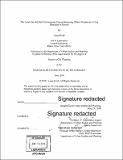The land use and built environment factors impacting where women are using bikeshare in Boston
Author(s)
Krull, Laura, M.C.P. Massachusetts Institute of Technology
DownloadFull printable version (13.55Mb)
Other Contributors
Massachusetts Institute of Technology. Department of Urban Studies and Planning.
Advisor
P. Christopher Zegras.
Terms of use
Metadata
Show full item recordAbstract
In the last 10-15 years, many cities across the U.S. have worked to create cities that are not just for motor vehicles. Even with these monetary and physical infrastructure investments, a very low percentage of people in the U.S. primarily use bicycles as a form of transportation, and a large gender gap exists in bicycling. Research suggests the gender gap is due to factors such as risk aversion, bicycling being less convenient to female household responsibility, and women having a stronger preference for safety than men. The objective of this thesis is to analyze built environment and land use factors related to bikeshare usage and investigate if these factors differ for men and women. Exploring how different factors might affect male and female ridership can reveal how gender differences manifest themselves in biking, and can lead to insights into why women bike at such low rates compared to men. In this thesis, I estimate direct ridership models for Boston's bikeshare system, Hubway, to predict trip origins based on a 14 demographic, safety, bicycle infrastructure, safety and transit explanatory variables. I find that many variables impact men and women similarly, particularly land use and demographic factors. The one variable that was significant in all models for women but not in any models for men was distance to separated bicycle facilities. This result indicates that for women, there are more trip origins at stations closer to separated bicycle facilities. I discuss the implication of these findings for city planners and Hubway or other bikeshare systems. The results point to the need for additional research on how experience level may also influence bikeshare usage.
Description
Thesis: M.C.P., Massachusetts Institute of Technology, Department of Urban Studies and Planning, 2018. Cataloged from PDF version of thesis. Includes bibliographical references (pages 97-103).
Date issued
2018Department
Massachusetts Institute of Technology. Department of Urban Studies and PlanningPublisher
Massachusetts Institute of Technology
Keywords
Urban Studies and Planning.